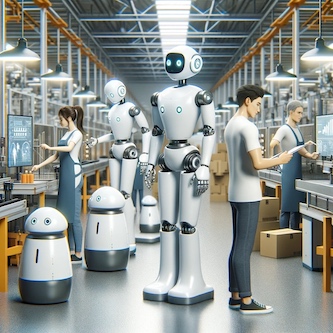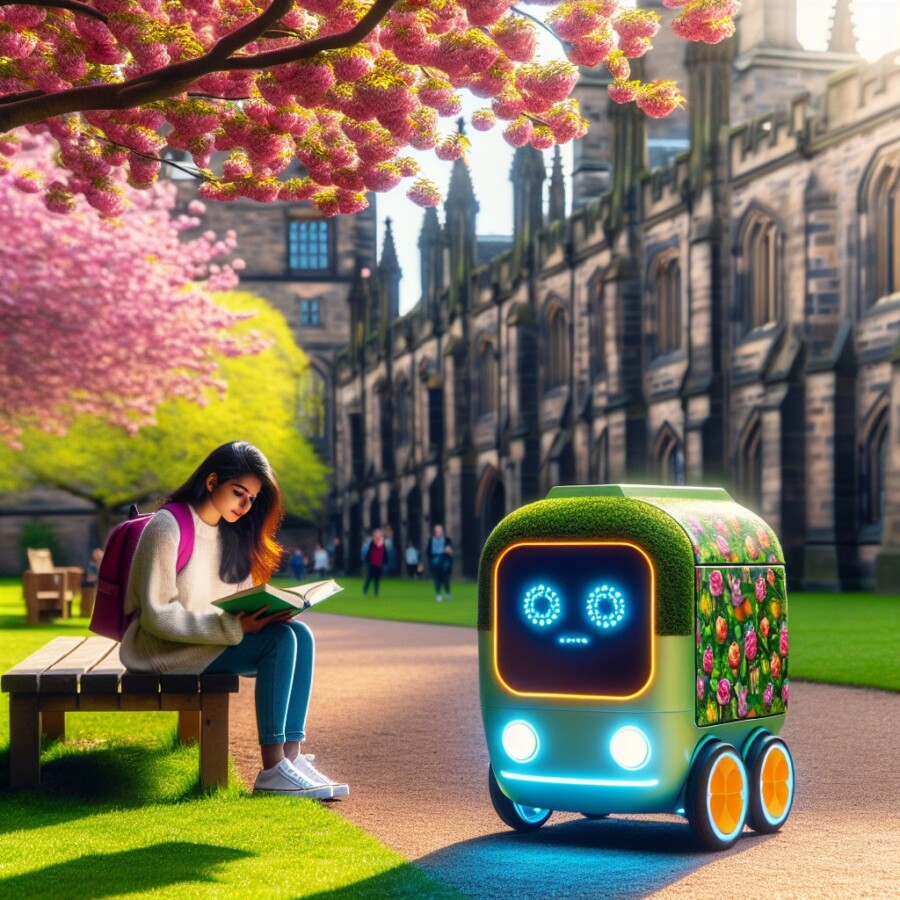Big machines in places where things are made are getting smart help. This smart help can tell if something is wrong with the machines. It can also look at things being made and find tiny mistakes. A drink company uses this smart help to keep their machines running well. The smart help can see things that people might not see.
The smart help also tells people where things come from. It can tell people what is in the things they buy. The smart help is now normal in making things. It can also help different places share what they can do. Some people worry about jobs for people, but the smart help can also keep people safe at work.
Original news source: How factories are deploying AI on production lines (BBC)
Listen
Slow
Normal
Fast
Group or Classroom Activities
Warm-up Activities:
– Vocabulary Pictionary
Instructions: Prepare flashcards with vocabulary from the article such as “machines,” “smart help,” “mistakes,” “company,” “running,” “tiny,” “normal,” “share,” “jobs,” and “safe.” Divide the class into two teams. One student from a team draws a card and sketches the word without writing letters or numbers. Their team has to guess the word in English within a set time limit. If they guess correctly, they get a point. Then, it’s the other team’s turn.
– News Reporter Role-play
Instructions: Pair up students and assign them roles, one as a news reporter and the other as an expert on smart technology in factories. Using information from the article, the reporter interviews the expert about the new smart help for machines, its benefits, and concerns about jobs. Encourage students to use their own words to explain what they have understood from the article.
– Opinion Poll
Instructions: Write a statement on the board: “Smart help in factories is good for workers.” Ask students to move to one side of the room if they agree and the other side if they disagree. Each student must give a simple reason in English for their opinion, using words from the article like “safe,” “jobs,” and “mistakes.” After everyone has spoken, discuss as a class whether opinions have changed.
– Word Association
Instructions: Say a word from the article, such as “smart.” Students must quickly say any word they associate with “smart” that comes to mind, which could be related to the article like “technology,” “help,” or other words like “intelligent,” “phone,” etc. If a student hesitates or repeats a word, they sit down. The last student standing is the winner.
– Sketch It
Instructions: Give each student a piece of paper and ask them to draw something related to the article, such as a machine, a person working with smart help, or a quality control process. They should not write any words. After a few minutes, have students show their drawings to the class and let others guess what aspect of the article they have drawn. This will help with comprehension and the ability to describe objects and processes in English visually.
Comprehension Questions:
1. What do big machines in places where things are made get?
2. What can the smart help do if something is wrong with the machines?
3. What kind of mistakes can the smart help find?
4. Which company uses the smart help for their machines?
5. What can the smart help see that people might not see?
6. What can the smart help tell people about the things they buy?
7. Why do some people worry about the smart help?
Go to answers ⇩
Listen and Fill in the Gaps:
Big machines in places where things are made are (1)______ smart (2)______. This smart help can tell if something is wrong with the machines. It can also look at things being made and find tiny mistakes. A drink (3)______ (4)______ this smart help to keep their machines running well. The smart help can see things that people might not see.
The (5)______ help also tells people where things come from. It can tell people what is in the things they buy. The smart help is now normal in (6)______ things. It can also help different places share what they can do. Some (7)______ (8)______ about jobs for people, but the smart help can also keep people safe at work.
Go to answers ⇩
Discussion Questions:
Students can ask a partner these questions, or discuss them as a group.
1. What is a machine?
2. Do you like smart things? Why or why not?
3. How would you feel if a robot helped you?
4. What is a mistake?
5. Do you think it is good to have help to find mistakes? Why?
6. Can you see very tiny things?
7. What is your favorite drink?
8. Do you like to know where things come from?
9. What is something you buy?
10. Do you think machines should help people? Why or why not?
11. Are you worried about robots taking people’s jobs?
12. Do you think robots can keep people safe? Why do you think that?
Individual Activities
Vocabulary Meanings:
Match each word to its meaning.
Words:
1. machines
2. smart
3. wrong
4. made
5. mistakes
6. company
7. people
8. work
Meanings:
(a) What you do to earn money and help others
(b) Clever and can do things on their own
(c) Humans, like you and me
(d) Created or produced
(e) A group of people who work together
(f) Things that are not done correctly
(g) Big things that make other things
(h) Not right or not working correctly
Go to answers ⇩
Multiple Choice Questions:
1. What can the smart help do for the machines?
(a) Make things faster
(b) Paint the machines
(c) Play music
(d) Tell if something is wrong
2. What can the smart help find in things being made?
(a) Big mistakes
(b) Toys
(c) Animals
(d) Tiny mistakes
3. What can the smart help tell people about the things they buy?
(a) What is in them
(b) How much they cost
(c) Where they were made
(d) What color they are
4. Is the smart help normal in making things?
(a) No
(b) Yes
(c) Sometimes
(d) Maybe
5. Can the smart help help different places share what they can do?
(a) Yes
(b) No
(c) Maybe
(d) I don’t know
6. What do some people worry about with the smart help?
(a) The weather
(b) The color of the machines
(c) Jobs for people
(d) The taste of the drinks
7. Can the smart help keep people safe at work?
(a) No
(b) Sometimes
(c) Yes
(d) I don’t know
8. Is the smart help good for the machines?
(a) No
(b) Yes
(c) Sometimes
(d) I don’t know
Go to answers ⇩
True or False Questions:
1. A drink company uses the smart help to hinder their machines running well.
2. Some people worry about jobs, but the smart help can also keep people safe at work.
3. The smart help can create mistakes in the things being made.
4. Many places now avoid using the smart help to make things.
5. Machines in factories are not getting smart help to make sure they work well.
6. The smart help can help different places share what they can do.
7. The smart help can tell people where things come from and what is in them.
8. The smart help can see things that people might not see.
Go to answers ⇩
Write a Summary:
Write a summary of this news article in two sentences.
Check your writing now with the best free AI for English writing!
Writing Questions:
Answer the following questions. Write as much as you can for each answer.
Check your answers with our free English writing assistant!
1. What are the big machines getting to help them?
2. What can the smart help do for the machines?
3. What can the smart help see that people might miss?
4. Why do people like to use the smart help when they make things?
5. What are some people worried about with the smart help?
Answers
Comprehension Question Answers:
1. What do big machines in places where things are made get?
The big machines get smart help.
2. What can the smart help do if something is wrong with the machines?
The smart help can tell if something is wrong with the machines.
3. What kind of mistakes can the smart help find?
The smart help can find tiny mistakes in things being made.
4. Which company uses the smart help for their machines?
A drink company uses the smart help for their machines.
5. What can the smart help see that people might not see?
The smart help can see things that people might not see.
6. What can the smart help tell people about the things they buy?
The smart help can tell people where things come from and what is in them.
7. Why do some people worry about the smart help?
Some people worry about jobs for people because of the smart help.
Go back to questions ⇧
Listen and Fill in the Gaps Answers:
(1) getting
(2) help
(3) company
(4) uses
(5) smart
(6) making
(7) people
(8) worry
Go back to questions ⇧
Vocabulary Meanings Answers:
1. machines
Answer: (g) Big things that make other things
2. smart
Answer: (b) Clever and can do things on their own
3. wrong
Answer: (h) Not right or not working correctly
4. made
Answer: (d) Created or produced
5. mistakes
Answer: (f) Things that are not done correctly
6. company
Answer: (e) A group of people who work together
7. people
Answer: (c) Humans, like you and me
8. work
Answer: (a) What you do to earn money and help others
Go back to questions ⇧
Multiple Choice Answers:
1. What can the smart help do for the machines?
Answer: (d) Tell if something is wrong
2. What can the smart help find in things being made?
Answer: (d) Tiny mistakes
3. What can the smart help tell people about the things they buy?
Answer: (a) What is in them
4. Is the smart help normal in making things?
Answer: (b) Yes
5. Can the smart help help different places share what they can do?
Answer: (a) Yes
6. What do some people worry about with the smart help?
Answer: (c) Jobs for people
7. Can the smart help keep people safe at work?
Answer: (c) Yes
8. Is the smart help good for the machines?
Answer: (b) Yes
Go back to questions ⇧
True or False Answers:
1. A drink company uses the smart help to hinder their machines running well. (Answer: False)
2. Some people worry about jobs, but the smart help can also keep people safe at work. (Answer: True)
3. The smart help can create mistakes in the things being made. (Answer: False)
4. Many places now avoid using the smart help to make things. (Answer: False)
5. Machines in factories are not getting smart help to make sure they work well. (Answer: False)
6. The smart help can help different places share what they can do. (Answer: True)
7. The smart help can tell people where things come from and what is in them. (Answer: True)
8. The smart help can see things that people might not see. (Answer: True)
Go back to questions ⇧














